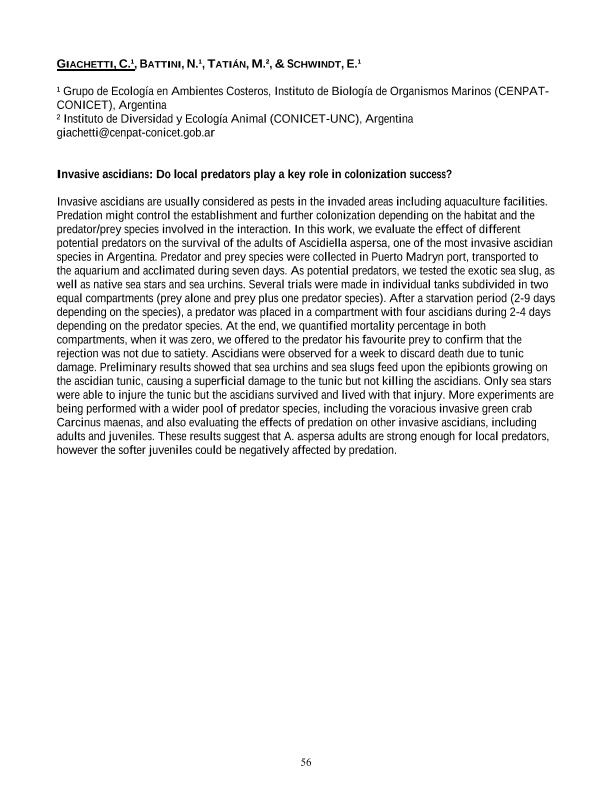Evento
Invasive ascidians: Do local predators play a key role in colonization success?
Tipo del evento:
Congreso
Nombre del evento:
Marine and Freshwater Invasive Species: Ecology, Impact and Management
Fecha del evento:
02/05/2016
Institución Organizadora:
Aquatic Ecosystem Health and Management Society;
Consejo Nacional de Investigaciones Científicas y Técnicas;
Título del Libro:
Abstract Book of Marine and Freshwater Invasive Species: Ecology, Impact and Management
Editorial:
Aquatic Ecosystem Health and Management Society
Idioma:
Inglés
Clasificación temática:
Resumen
Invasive ascidians are usually considered as pests in the invaded areas including aquaculture facilities. Predation might control the establishment and further colonization depending on the habitat and the predator/prey species involved in the interaction. In this work, we evaluate the effect of different potential predators on the survival of the adults of Ascidiella aspersa, one of the most invasive ascidian species in Argentina. Predator and prey species were collected in Puerto Madryn port, transported to the aquarium and acclimated during seven days. As potential predators, we tested the exotic sea slug, as well as native sea stars and sea urchins. Several trials were made in individual tanks subdivided in two equal compartments (prey alone and prey plus one predator species). After a starvation period (2-9 days depending on the species), a predator was placed in a compartment with four ascidians during 2-4 days depending on the predator species. At the end, we quantified mortality percentage in both compartments, when it was zero, we offered to the predator his favourite prey to confirm that the rejection was not due to satiety. Ascidians were observed for a week to discard death due to tunic damage. Preliminary results showed that sea urchins and sea slugs feed upon the epibionts growing on the ascidian tunic, causing a superficial damage to the tunic but not killing the ascidians. Only sea stars were able to injure the tunic but the ascidians survived and lived with that injury. More experiments are been performing with a wider pool of predator species, including the voracious invasive green crab Carcinus maenas, and also evaluating the effects of predation on other invasive ascidians, including adults and juveniles. These results suggest that A. aspersa adults are strong enough for local predators, however the softer juveniles could be negatively affected by predation.
Palabras clave:
INVASIVE ASCIDIANS
,
PREDATION
,
MARINE PORTS
Archivos asociados
Licencia
Identificadores
Colecciones
Eventos(CCT-CENPAT)
Eventos de CTRO.CIENTIFICO TECNOL.CONICET - CENPAT
Eventos de CTRO.CIENTIFICO TECNOL.CONICET - CENPAT
Eventos(IBIOMAR)
Eventos de INSTITUTO DE BIOLOGIA DE ORGANISMOS MARINOS
Eventos de INSTITUTO DE BIOLOGIA DE ORGANISMOS MARINOS
Citación
Invasive ascidians: Do local predators play a key role in colonization success?; Marine and Freshwater Invasive Species: Ecology, Impact and Management; Buenos Aires; Argentina; 2016; 56-56
Compartir




